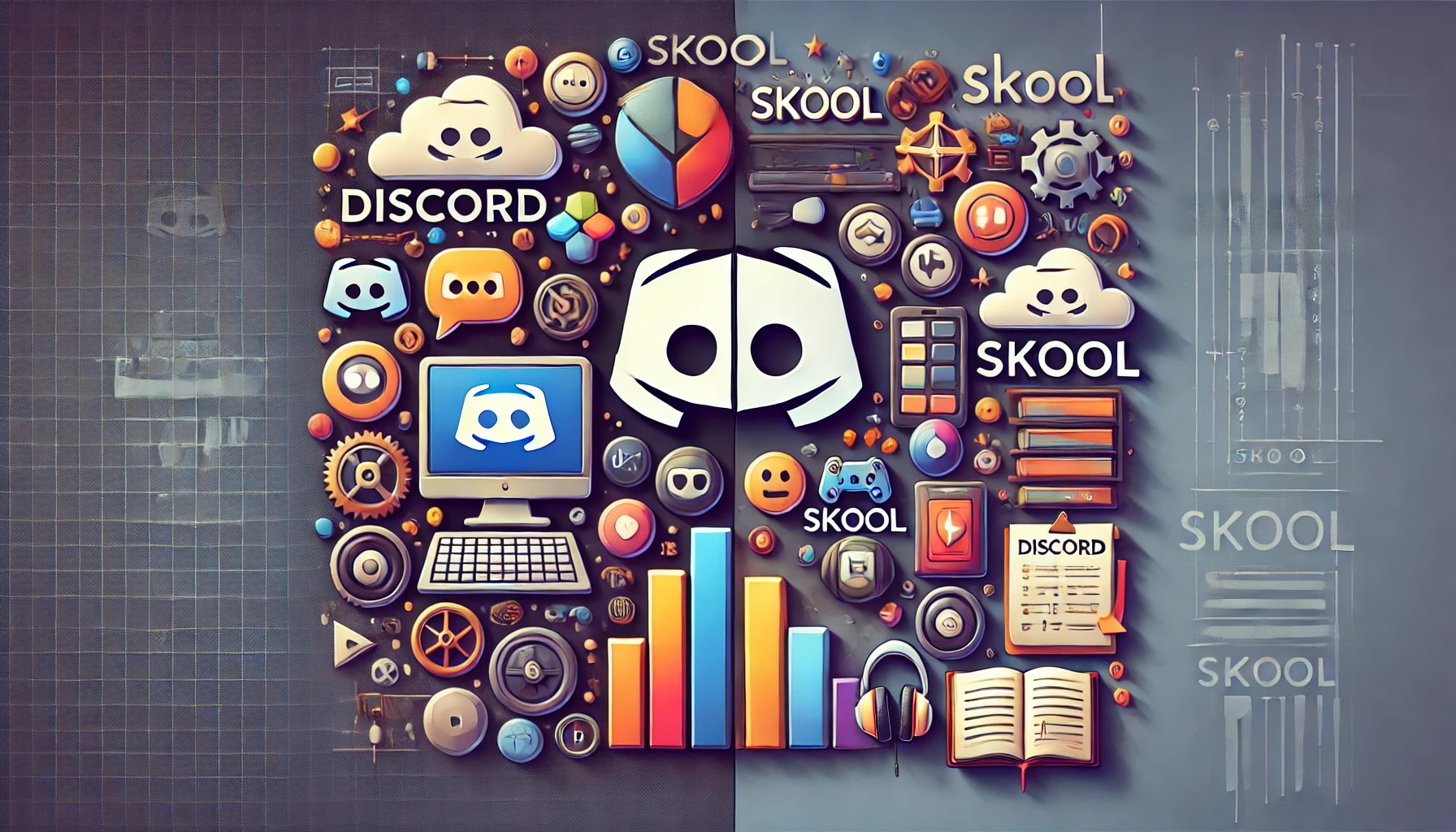
the question what is the difference between discord and skool?
So, you're on the hunt for the perfect platform to host your community, and you've narrowed it down to Discord and Skool. Awesome! But now you're scratching your head, wondering, "What is the difference between Discord and Skool?" Well, you're in the right place! Let’s dive into the nitty-gritty of these two platforms and figure out which one suits your needs best.
Discord: The Ultimate Hub for Dynamic, Real-Time Communities
Discord—if you’re a gamer, you’ve probably heard of it. But these days, Discord has evolved far beyond its gaming roots. It’s now the go-to for all sorts of communities, from tech enthusiasts to book clubs. What makes Discord so popular? It’s all about real-time communication. Whether you're chatting in text channels, hopping on a voice call, or hosting a video hangout, Discord has you covered.
Customization is King: Discord lets you create channels for everything under the sun. Want a space for general chat, another for sharing memes, and a third for deep-dive discussions? Done. You can even throw in bots for moderation, games, and more. However, with great power comes great…clutter. Yep, if you’re not careful, Discord can turn into a chaotic mess of channels and notifications.
Integration Heaven: Discord plays well with others. You can integrate it with countless third-party apps and services, making it a flexible choice for communities that need a bit of everything.
Related Article: What is the difference between Facebook group and Skool?
Skool: Tailored for Education and Structured Learning
Now, Skool is a different beast altogether. Built specifically with educators and content creators in mind, Skool is all about structure and focus. It’s designed to help you build and manage a community around courses, educational content, and more.
All About the Learning: Skool isn’t trying to be the next big chat app. Instead, it’s focused on creating a space where learning and engagement go hand in hand. You get forums instead of chaotic chat channels, where discussions can stay organized and on-topic. It’s like having a well-ordered library versus a buzzing coffee shop.
Monetization Made Simple: Unlike Discord, where monetization is more of a DIY affair (hello, Patreon), Skool comes with built-in tools to help you monetize your community. You can set up paid courses, charge for access to exclusive content, and even manage subscriptions—all without leaving the platform.
Feature Showdown: Communication, Customization, and Monetization
So, when it comes to features, how do these two stack up?
- Real-Time Communication: Discord is the clear winner here. Its channels, voice, and video capabilities are perfect for communities that thrive on instant interaction. Skool, on the other hand, focuses on more structured, asynchronous communication.
- Customization and Flexibility: If you want to build a community that can do it all—gaming, chatting, collaborating—Discord’s your best bet. Skool is less about customization and more about providing a streamlined, focused experience for learning.
- Monetization: Skool takes the crown here. With built-in payment processing and course management, it’s a no-brainer for educators looking to turn their content into cash. Discord, while flexible, requires external tools to monetize effectively.
Which Platform Should You Choose?
Alright, let’s cut to the chase. If you’re building a community around real-time interaction—whether it’s for gaming, tech, or just hanging out—Discord is your jam. It’s flexible, fun, and perfect for keeping the conversation flowing.
But if your focus is on education, course creation, or building a structured learning environment, Skool is the way to go. It’s designed to keep things organized, making it easier for you to manage your content and monetize your community.
| Feature | Discord | Skool |
|---|---|---|
| Primary Purpose | Real-time communication for diverse communities, originally gaming-focused | Structured learning and community management, focused on education |
| Communication | Real-time text, voice, and video chat | Asynchronous forums and structured discussions |
| Customization | Highly customizable with channels, roles, and bots | Limited customization, focused on course management and user experience |
| Integration | Extensive third-party integrations, including bots and gaming tools | Limited integrations, with a focus on educational tools |
| Monetization | Indirect monetization through external platforms like Patreon | Built-in monetization with payment processing, course sales, and subscriptions |
| User Experience | Flexible but can become cluttered, requires active management | Streamlined and user-friendly, focused on ease of navigation |
| Best For | Dynamic, real-time communities that need flexible communication tools | Educators, course creators, and communities focused on structured learning |
| Cost | Free with optional premium features | Subscription-based with a focus on value for educational content delivery |
| Pros | Flexibility, real-time communication, wide range of integrations | Tailored for education, easy monetization, distraction-free environment |
| Cons | Can be chaotic, indirect monetization, learning curve for management | Less flexible, limited customization, primarily focused on education |
Pros and Cons in a Nutshell
- Discord:
- Pros: Real-time communication, endless customization, wide range of integrations.
- Cons: Can get cluttered, indirect monetization options.
- Skool:
- Pros: Tailored for education, easy monetization, focused and distraction-free environment.
- Cons: Less flexibility, might feel restrictive compared to Discord.
Finding the Right Platform for Your Community
At the end of the day, the choice between Discord and Skool boils down to your community’s needs. Do you crave dynamic, real-time interaction? Discord’s your go-to. Are you looking to build a structured, educational community? Skool’s got your back. Whichever path you choose, you’ll be set up for success—just be sure to pick the platform that aligns with your goals!
Related Article: How many people use Skool?